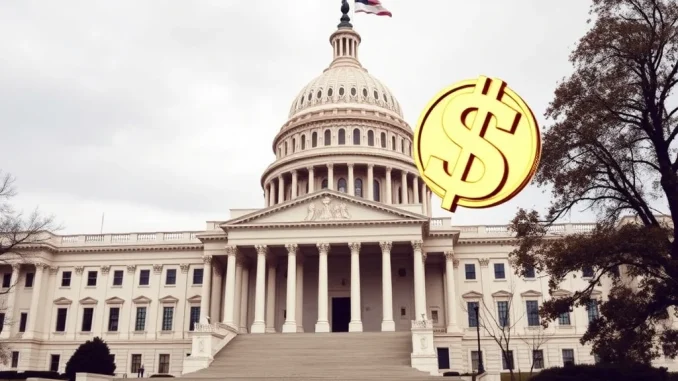
The cryptocurrency landscape is constantly evolving, and one area receiving significant attention is stablecoin regulation. A potential turning point is on the horizon with the proposed GENIUS Act, which some observers believe could represent a rare moment of bipartisan agreement in the U.S. political system regarding digital assets.
Could the GENIUS Act Signal a New Era of Bipartisan Legislation?
In a notable observation shared on X, venture capitalist David Sacks highlighted the significance of the proposed GENIUS Act. According to Cointelegraph, Sacks suggested this legislation, specifically aimed at addressing stablecoin regulation, could potentially mark the first instance of major bipartisan legislation successfully navigating the U.S. Congress and passing into law in several years. This perspective from a prominent figure in the tech and investment world underscores the potential importance of this bill beyond just the crypto sector.
What is the GENIUS Act and Why Does it Matter for Stablecoins?
While specific details of the GENIUS Act’s provisions for stablecoin regulation were not extensively detailed in the report, its focus on this class of digital assets is key. Stablecoins are cryptocurrencies designed to maintain a stable value relative to a specific asset or basket of assets, most commonly the U.S. dollar. They play a crucial role in the broader crypto ecosystem, facilitating trading, lending, and payments. The lack of clear federal regulation in the U.S. has been a point of discussion and concern for issuers, users, and regulators alike. The GENIUS Act aims to provide a framework for these assets.
Here’s why regulatory clarity is sought after:
- Consumer Protection: Establishing rules can help protect users from risks associated with stablecoin reserves and operations.
- Market Integrity: Regulation can contribute to the stability and integrity of financial markets where stablecoins are used.
- Innovation Certainty: Clear rules can provide businesses with the certainty needed to innovate and build on stablecoin technology.
The Road Ahead: The US Senate Crypto Vote
The path for the GENIUS Act is reaching a critical juncture. The report indicates that the legislation is scheduled for a final vote in the US Senate crypto discussions on June 17. This upcoming vote is pivotal, as it will determine whether the bill moves forward and potentially becomes law. The fact that it is being discussed as a piece of potential bipartisan legislation suggests it has garnered support from across the political aisle, a rare feat in the current legislative climate.
The involvement of figures like David Sacks crypto observations often draw attention, particularly when they touch upon the intersection of technology, finance, and policy. His view on the bipartisan potential of the GENIUS Act highlights the growing recognition among policymakers and industry leaders that regulating digital assets, particularly stablecoins, is a pressing issue that requires collaborative solutions.
Why is Bipartisan Legislation Significant for Crypto?
The cryptocurrency industry has often found itself caught in partisan debates in the U.S. Congress. Achieving bipartisan legislation would be a significant development for several reasons:
- It signals a broader consensus on the need for action, rather than just partisan posturing.
- It increases the likelihood of a bill passing and becoming enduring law.
- It can provide more stability and predictability for the industry compared to regulations driven by a single party.
The focus on stablecoin regulation within the GENIUS Act could be a strategic area for finding common ground, as stablecoins interact closely with traditional finance and currency, making their regulation potentially less politically charged than other, more volatile aspects of the crypto market.
What Could This Mean for the Future of Stablecoins and US Crypto Policy?
If the GENIUS Act passes the US Senate crypto vote, it would set a precedent for federal engagement with digital assets. While it focuses specifically on stablecoins, successful passage could pave the way for future bipartisan legislation addressing other areas of the crypto market. Investors, developers, and users are watching closely to see if this bill lives up to the potential highlighted by figures like David Sacks crypto insights often reflect broader market sentiment and political feasibility.
The outcome of the June 17 vote will be a key indicator of Congress’s ability to collaborate on complex technological and financial issues. Regardless of the specific details of the bill, its journey through the Senate is a significant event for anyone interested in the future of digital currency and regulation in the United States.
Summary: A Glimmer of Hope for Crypto Legislation?
The potential passage of the GENIUS Act, highlighted by David Sacks as possibly the first significant bipartisan legislation in years, represents a critical moment for stablecoin regulation in the U.S. With a final vote expected in the US Senate crypto discussions on June 17, the industry and observers are keenly awaiting the outcome. This development could signal a new phase of regulatory clarity and collaborative policymaking for digital assets in the United States, moving beyond partisan divides to establish foundational rules for a vital part of the crypto economy.



